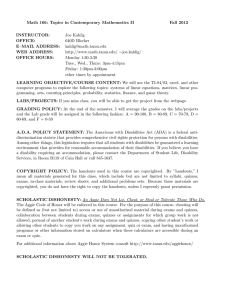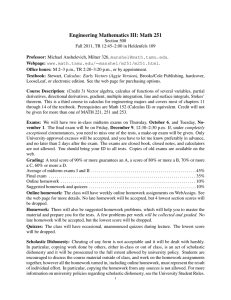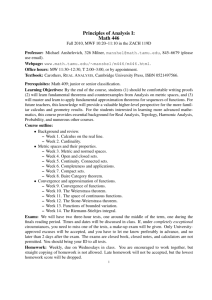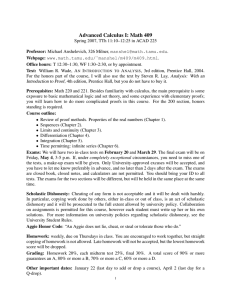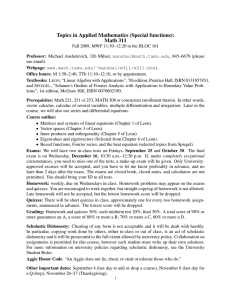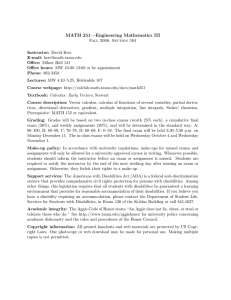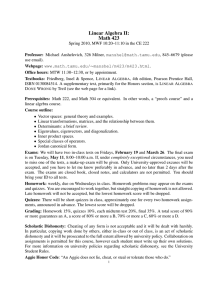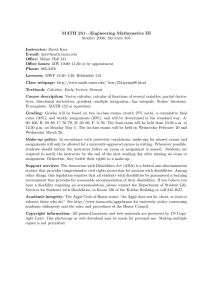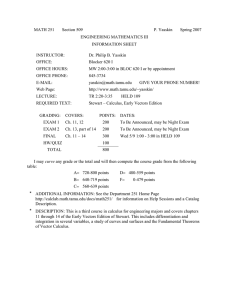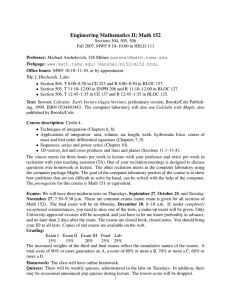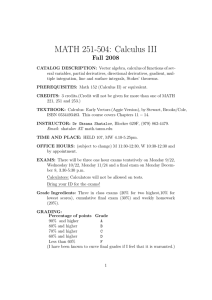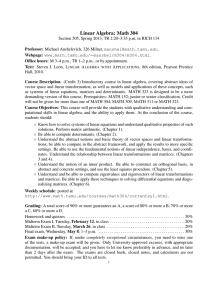Calculus: Math 172
advertisement
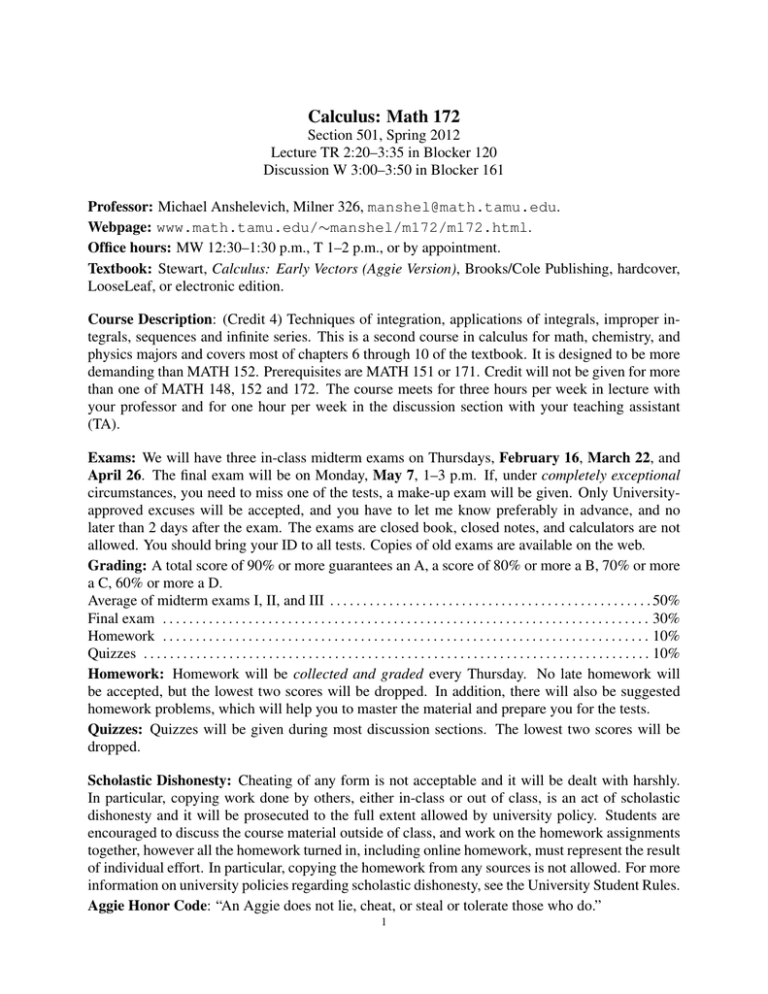
Calculus: Math 172 Section 501, Spring 2012 Lecture TR 2:20–3:35 in Blocker 120 Discussion W 3:00–3:50 in Blocker 161 Professor: Michael Anshelevich, Milner 326, manshel@math.tamu.edu. Webpage: www.math.tamu.edu/∼manshel/m172/m172.html. Office hours: MW 12:30–1:30 p.m., T 1–2 p.m., or by appointment. Textbook: Stewart, Calculus: Early Vectors (Aggie Version), Brooks/Cole Publishing, hardcover, LooseLeaf, or electronic edition. Course Description: (Credit 4) Techniques of integration, applications of integrals, improper integrals, sequences and infinite series. This is a second course in calculus for math, chemistry, and physics majors and covers most of chapters 6 through 10 of the textbook. It is designed to be more demanding than MATH 152. Prerequisites are MATH 151 or 171. Credit will not be given for more than one of MATH 148, 152 and 172. The course meets for three hours per week in lecture with your professor and for one hour per week in the discussion section with your teaching assistant (TA). Exams: We will have three in-class midterm exams on Thursdays, February 16, March 22, and April 26. The final exam will be on Monday, May 7, 1–3 p.m. If, under completely exceptional circumstances, you need to miss one of the tests, a make-up exam will be given. Only Universityapproved excuses will be accepted, and you have to let me know preferably in advance, and no later than 2 days after the exam. The exams are closed book, closed notes, and calculators are not allowed. You should bring your ID to all tests. Copies of old exams are available on the web. Grading: A total score of 90% or more guarantees an A, a score of 80% or more a B, 70% or more a C, 60% or more a D. Average of midterm exams I, II, and III . . . . . . . . . . . . . . . . . . . . . . . . . . . . . . . . . . . . . . . . . . . . . . . . . 50% Final exam . . . . . . . . . . . . . . . . . . . . . . . . . . . . . . . . . . . . . . . . . . . . . . . . . . . . . . . . . . . . . . . . . . . . . . . . . . 30% Homework . . . . . . . . . . . . . . . . . . . . . . . . . . . . . . . . . . . . . . . . . . . . . . . . . . . . . . . . . . . . . . . . . . . . . . . . . . 10% Quizzes . . . . . . . . . . . . . . . . . . . . . . . . . . . . . . . . . . . . . . . . . . . . . . . . . . . . . . . . . . . . . . . . . . . . . . . . . . . . . 10% Homework: Homework will be collected and graded every Thursday. No late homework will be accepted, but the lowest two scores will be dropped. In addition, there will also be suggested homework problems, which will help you to master the material and prepare you for the tests. Quizzes: Quizzes will be given during most discussion sections. The lowest two scores will be dropped. Scholastic Dishonesty: Cheating of any form is not acceptable and it will be dealt with harshly. In particular, copying work done by others, either in-class or out of class, is an act of scholastic dishonesty and it will be prosecuted to the full extent allowed by university policy. Students are encouraged to discuss the course material outside of class, and work on the homework assignments together, however all the homework turned in, including online homework, must represent the result of individual effort. In particular, copying the homework from any sources is not allowed. For more information on university policies regarding scholastic dishonesty, see the University Student Rules. Aggie Honor Code: “An Aggie does not lie, cheat, or steal or tolerate those who do.” 1 Students with disabilities: Come talk to me no later than the first week of classes. “The Americans with Disabilities Act (ADA) is a federal anti-discrimination statute that provides comprehensive civil rights protection for persons with disabilities. Among other things, this legislation requires that all students with disabilities be guaranteed a learning environment that provides for reasonable accommodation of their disabilities. If you believe that you have a disability requiring an accommodation, please contact the Department of Student Life, Services for Students with Disabilities, in Room 126 of the Koldus Building or call 845–1637.” Attendance: According to the University Student Rules, absence for three or more class days requires a University-approved excuse and documentation. Other important dates: January 23 (last day to add or drop a course), March 12-16 (spring break), April 2 (Q-drop), April 6 (reading day), April 26 (last day of classes). Course topics: • Techniques of integration (Chapters 6, 8). ◦ Fundamental theorem of calculus. Substitution. Integration by parts. Trigonometric integrals. Partial fractions. • Applications of integration (Chapters 7, 9). ◦ Area, volume, arc length, work, hydrostatic force. First order differential equations. • Infinite sequences and series (Chapter 10). ◦ Sequences. Series: definition and convergence. Power series and Taylor series. Weekly schedule: (approximate, subject to adjustment) Week 1: 6.1-6.3, 6.4. Week 6: 8.4, 8.9. Week 10: Week 2: 6.5, 6,6, 7.1. Week 7: 8.8, 9.1, 9.2. Week 11: Week 3: 7.2, 7.3. Week 8: 9.3, 9.6. Week 12: Week 4: 7.4, 7.5, 8.1. Spring break Week 13: Week 5: 8.2, 8.3, E1. Week 9: 10.1, E2. Week 14: 10.1, 10.2. 10.3, 10.4. 10.5, 10.6. 10.7, 10.8. 10.9, E3. Keys to success: Attend class (of course :) Solve all the homework problems, well before the exams. Spend more than seven hours per week working on the problems. Form study groups to discuss the course material and homework problems. Read ahead in the text. All printed handouts and web-materials are protected by US Copyright Laws. No multiple copies can be made without written permission by the instructor.
